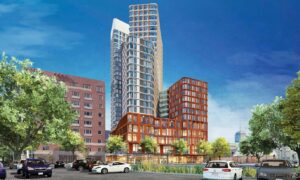
COVID-19 shows Boston would be better off with many more projects like this 26-story, 800-bed Northeastern University dormitory tower proposed in Roxbury. Image courtesy of Elkus Manfredi Architects
You learn two things fast when covering residential real estate as a reporter.
Brokers are some of the chattiest people in the world, but they hate anything – and I mean truly anything – that could be perceived as negative news, so they will lay it on thick when asked about the condition of the market.
Woe to the writer who swallows this pablum, for it can lead to the publication of some truly head-scratching stories.
A case in point is a July story that ran in a significant local news outlet which shall remain nameless, that quoted “experts” as predicting little fallout in the rental market from the expected drop in enrollment in Boston’s many colleges and universities amid the coronavirus pandemic.
“My firm is seeing massive new demand from undergrads,” noted one real estate investor who focused on student housing.
Well, it turns out nothing could have been further from the truth.
College Kids Tanked the Market
Six months later, rental rates in Boston have done far more than just edged down a bit.
Rather, they’ve posted double-digit declines of the likes not seen in years.
RENTCafé reported an 8.3 percent decline in Boston rents in November compared to the 2019, which seems steep until you get to the numbers spouted by competing online rental market sites.
Apartment List pegs the rent decline in Boston at a stunning 17.2 percent from February, just before the pandemic hit, through November.
And for its part Zumper reports double-digit rent declines in student- packed Cambridge, Boston and Brookline of 15 percent, 14 percent and 13 percent, respectively.
Moreover, the decline goes well beyond the luxury end of the rental market.
Everyone and their brother have known for years now that the top of the market has been wildly overbuilt, with new deluxe apartment towers having grown seemingly on every corner in Boston and its environs.
Instead, the rental declines are taking shape across the board and in neighborhoods across the city, a drop in demand that is so widespread that all signs point one demographic group with the power to tank the market: college students.
Campuses across Boston and its suburbs have turned into veritable ghost towns amid the pandemic, with only a limited number of students allowed back on campus.
Now, based on the industry happy talk cited above, some real estate brokers and the landlords clearly hoped they would see a flood of students turning to the rental market after being unable to find a bed on campus.
But with many classes being taught remotely and college social life reduced to Zoom calls and texting, it’s hard to see what the incentive would be to spend $2,000 a month on an off-campus apartment.
Clearly many students – and their cash-strapped parents – are opting for the cheaper option of simply staying home.
Students Fell by Half in Fall
The stats we have so far back this up.
The number of students living off campus or at home, which stood at 98,000 last year, has fallen by roughly half, according to preliminary city figures.
While students are great – don’t get me wrong – sadly we not looking at a long-term shift in Boston’s grossly over-inflated rental market.
The arrival of the first doses of coronavirus vaccines at hospitals in Boston last week signals the beginning of the end for COVID-19’s ghastly reign. Along with that will come the return of tens of thousands of students to Boston campuses next fall.
But the sudden plunge in rents amid these students’ exodus has nonetheless provided a vivid illustration as to just how much our local universities distort the local rental market.
Student renters have long turned neighborhoods across the city into veritable dormitories, with the ability to pool their resources – or more accurately, mom’s, dad’s and lenders’ – and outbid regular renters for available properties.
Marty Walsh, Take Note
Under the lash of the coronavirus pandemic, the past nine months have amounted to a vast market experiment that economists could previously only have dreamed conducting.
City officials, who under the Walsh administration have ramped up efforts to prod colleges and universities to house more student on campus, should take the appropriate lessons from the dark days of 2020.

Scott Van Voorhis
That means standing fast in the face of neighborhood NIMBYs in Boston and elsewhere who often decry dorm construction as just another facet of relentless university expansion.
Boston is a vibrant city in no small part due to the vast array of colleges and universities.
But the students have to live somewhere.
And there is no better place for students than on-campus dorms, where at least they are not out competing with middle- and working-class families for scarce rentals in Roxbury, Allston and beyond.
Scott Van Voorhis is Banker & Tradesman’s columnist; opinions expressed are his own. He may be reached at sbvanvoorhis@hotmail.com.




